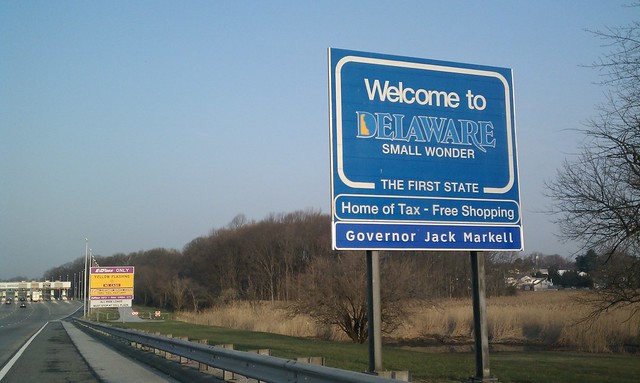Delaware is not Panama
/A few days ago, The New York Times ran an article, "Need to Hide Some Income? You Don’t Have to Go to Panama," which implies that hundreds of thousands of corporations are setting up Panama-style tax havens in Delaware, Nevada, and Wyoming. (The article is an update of a 2012 article, with a release timed to coincide with the attention focused on the Panama Papers.)
This article is misleading. Well, maybe that's too strong -- the information is mostly accurate, but it's presented in a fairly sensationalist way. No, incorporating in Delaware is not a giant tax dodge.
Delaware does have favorable corporate laws, in the lack of fees, secrecy laws, and lack of certain state income taxes. But as virtually any lawyer will tell you, the primary reason that businesses like incorporating in Delaware is the ease of incorporation and the robustness of Delaware's corporate law.
On the first point, many entirely legal and legitimate business transactions involving mergers and acquisitions involve setting up new or temporary business vehicles to hold assets or funds as the entities shift around. Firms appreciate being able to set up LLCs quickly and cheaply in order to facilitate their business.
Second, Delaware's Court of Chancery, a court of equity, has a long history of administering corporate disputes.
(History time! Stretching back to England, there were separate courts of "law" and "equity." Put extremely loosely, the "law" courts dealt with "common" claims and were strictly bound by precedent and statute, while the "equity" dealt with issues of rights and obligations and had authority to settle cases based on fairness or reason. The distinction between law and equity is carried through to today; you have a right to a jury in "law" cases but not "equity" cases, and the standard is literally "would this claim have been in law or equity in the 18th century?" Today, the distinction is basically that "law" claims deal with money damages, while "equity" claims deal with injunctions, restraining orders, specific performance, and other cases where you're asking the court to make someone else do something besides paying money.)
Because Delaware does offer some tangible benefits to businesses formed there, long ago businesses began incorporating there in large numbers. This led to a huge number of corporate disputes being litigated in Delaware, particularly in regard to shareholder rights (a topic that can get very complex). The large number of disputes leads to experienced judges and a large volume of established case law, which makes it much easy for corporations, executives, directors and shareholders to have clarity about the scope of their rights and obligations. For instance, if a director is faced with some specific decision and is unsure what his obligations to shareholders are, it's much more likely his attorney will find a similar situation in previous Delaware case law than in a state with far fewer cases, like Missouri. Or, if a contract dispute is brewing, it's much more likely the attorneys will be able to search for specific contract wording and find a case where a judge interpreted those specific terms (given that companies and attorneys tend to recycle contract templates). If I'm thinking of investing money into a company, I have a greater understanding of my rights as a shareholder if that company is in Delaware.
The Times article is fairly light on how incorporation in Delaware itself constitutes a tax dodge. The article relies heavily on the idea that Delaware makes it easy to form "anonymous" LLCs, but then admits that “[y]ou can create anonymous companies anywhere in the United States.” The article quotes Gabriel Zucman as stating that "[y]ou see a ton of wealth in tax havens in Switzerland and the Cayman Islands that is owned by shell companies that are incorporated in Panama or in Delaware. The bulk of this wealth does not seem to be duly declared on tax returns.” Okay, but the tax dodge isn't the incorporation in Delaware, it's the creation of the haven in Switzerland or the Cayman Islands -- maybe Delaware made it more easy to incorporate the entity used for the dodge, but it's not that hard to incorporate anywhere.
The only other concrete statement regarding alleged U.S. tax dodging is that "Delaware allows companies to shift royalties and similar revenues where they actually do business to holding companies in Delaware, where they are not taxed." That's true -- Delaware does not tax royalties for intangible assets like intellectual property, and so companies will shift such assets to a Delaware holding company to avoid paying taxes on that revenue. But is that such a bad thing? The purpose of taxes is to offset the spending by the state to our benefit, but the nature of intangible assets is that they have no physical existence; if I'm in California, is California really spending any resources relating, say, to my copyright over this post?
Further, we're not talking about a gigantic amount here, relatively speaking. The Times's 2012 Delaware piece estimated that this loophole costs about $950 million in state taxes a year, compared against the $688 billion that corporations pay in state and local taxes every year.
While a Delaware corporation might pay a very low corporate income tax to that state, the company is still on the hook for a host of other taxes, including federal income taxes, sales taxes, employment taxes, property taxes, and others -- in 2014, only 9.4% of state and local taxes were paid as income taxes. Further, even a Delaware corporation has tax obligations to the states from which they derive income.
I'm not saying that incorporating in Delaware doesn't offer tax advantages. Of course it does. However, there's a giant difference between finding a strategy within the rules to lower your tax burden, and hiding your funds to misrepresent your actual tax burden. Every one of us, if we're smart, does the former. Equating incorporation in Delaware to setting up a haven in Panama is absurd.

